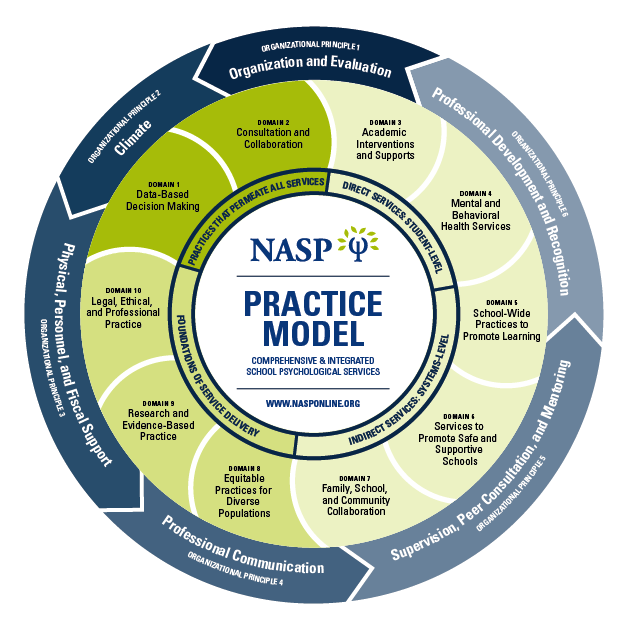Program Information
The Idaho State University Educational Specialist in School Psychology program is Idaho's only school psychology program and is designed to meet the educational requirements for school psychologists (Professional Licensure Disclosure for School Psychology). The program is fully approved by the National Association of School Psychologists (until 2027) with evidence of consistency with the NASP standards for graduate preparation of school psychologists.
As a demand for child psychological services is projected to increase over the next decade, candidates in this program will learn the necessary skills and knowledge to make a difference and improve the psychosocial and academic success of children in P-12 schools.
-
Interactive, distance learning classes offered fully online, synchronously.
- No entry exams required along with no dissertation work with part-time or full-time enrollment options.
-
8 : 1 student to teacher ratio providing candidates the opportunity to work closely with our talented and passionate faculty.
-
Advanced research opportunities for candidates to participate on grant funded faculty research on the regional, national, or international levels.
-
Admitted students can learn more about qualifying for scholarships and in-state tuition.
Candidates usually enter the program with a bachelors's degree and complete our M.Ed. of School Psychological Examiner and then continue their study by applying for the 64 credit Education Specialist in School Psychology. This program aligns with the National Association of School Psychologists’ professional standards and is the minimum preparation level for school psychologists and special education directors in most states. This program can lead you to licensure/certification as a school psychologist in Idaho.
-
For licensing requirements in other states, visit: NASP-State School Psychology Credentialing Requirements.
EMPWRing Fellowship
Pursue a school psychology degree with tuition covered for three years of full-time study, including an immersive internship in the final year of study.
We are excited to share a great opportunity for those passionate about making a difference in empowering Idaho's mental health practices! To address the critical shortage of school psychologists, the Idaho State University School Psychology Program is going to offer a fully-funded path to a rewarding career, utilizing a cutting-edge distance learning model to recruit, coach, and collaborate with high-need schools across Idaho.
The EMPWRing full-tuition waiver has been available for two students who started in summer 2025, expanding to six students in 2026, and reaching eight students by 2027. In return for this financial support, graduates will dedicate three years to serving in high-need schools in Idaho, bringing their skills and passion to the communities that need them most.
ISU School Psychology Program applications will be reviewed starting after the winter break, and the new cohort will begin each summer. Just don't miss this chance to be part of a transformative journey that empowers both you and the future of Idaho's school-based mental health services. Apply now and help shape a better tomorrow!
Support, Funding, and Application
Admission and Program Requirements
Candidates for the Ed.S in School Psychology must meet the ISU Graduate School admissions requirements for admission and retention. Preference is given to applicants with an undergraduate major in psychology or education (including special education) and a GPA above 3.0. The preferred deadline to be considered for summer semester admission is January 1st. If there is availability, we do accept some competitive students after January 1st. Our program admits about six to eight students each year.
Our students usually enter the program with a bachelors's degree and complete their M.Ed. of School Psychological Examiner before being accepted to continue their study toward an Ed.S. degree. Other master’s degree majors in a closely related field may be approved upon recommendation of the selection committee. However, they may be required to take additional, prerequisite coursework.
General Requirements
All post-master’s degree course work must be taken from members of the Idaho State University graduate faculty or be approved in advance by the graduate faculty. A minimum grade point average of 3.0 (B) is required over all course work taken in the M.Ed./Ed.S. program. An oral examination covering the specialist paper, portfolio, and/or relevant topics is required.
Time Requirement
All requirements for the Ed.S. must be completed within a period of five years from the date of completion of the first post-master’s degree course to be applied toward the degree.
ISU Course Catalog
School Psychology Major Information
The Ed.S. in School Psychology is designed to be consistent with the minimum entry-level requirements in the field of school psychology as presented by the National Association of School Psychologists. A master's degree as a school psychological examiner or its equivalent is required. The Ed.S. is viewed as a practitioner's degree and will focus on applied activities.
The Ed.S. candidate must complete a minimum of 64 credits in School Psychology, including the master degree and 6 credits for the supervised specialist-level internship experience (1200 hours).
Additional Requirements
Students will also prepare a School Psychology Portfolio. The Portfolio will be presented and defended in the Oral Examination. The School Psychology Portfolio must be completed successfully during the Ed.S. course of study.
NASP Practice Model

What does it look like?
- Data-Based Decision Making:Our students will be able to impact children through the collection, interpretation, and use of data. They will be able to use this data to create appropriate interventions.
- Consultation & Collaboration:Our students will be able to indirectly impact children through consultation and collaboration with teachers, families, systems, etc.
- Support of Academic Skills:Our students will be able to impact children through their expertise in learning and developmental theory, and academic intervention strategies.
- Support of the Mental Health, Social & Life Skills:Our students will be able to impact children through their expertise in mental health.
- School-Wide Interventions:Our students will be able to indirectly impact children through their knowledge of system theory and their expertise in the creation of system wide change.
- Preventative & Responsive Services:Our students will be able to impact children through their knowledge of resiliency, protective and risk factors and their experiences in implementing preventative services.
- Family-School Collaboration:Our students will be able to impact children through their ability in bridging the connection between school and family.
- Diversity Practice:Our students will be able to impact children through their awareness, knowledge, and skills in the area of diversity. This competency is imbued throughout their practice. They will be seen as a beacon of inclusion and culturally competent practice.
- Research & Evaluation:Our students will be able to impact children through their knowledge of research, statistics, and program evaluation. They will be able to use this information to make real world positive impact within the schools.
- Legal & Ethical Practice:Our students will be able to impact children through advocacy and ethical practice. They will standup for the rights of our students and always perform in a legally and ethically exemplary manner.

Dr. Joel Bocanegra
Professor of School Psychology
Office: College of Education 108A

Erika K. Coles, PhD
Associate Professor of School Psychology
Office: College of Education 107 A
Dr. Erika Coles completed her Ph.D. in Clinical Psychology at the State University of New York (SUNY) at Buffalo in 2007. She is currently an Associate Professor in the School Psychology and Educational Leadership Department at Idaho State University, as well as a licensed psychologist. Her research interests include dissemination of evidence-based interventions for ADHD and related disorders, particularly in regular education classrooms. Dr. Cole is the Co-Principal Investigator of the EMPWRing grant.

Chung-Hau (Howard) Fan, PhD
Program Coordinator | Professor of School Psychology
Office: College of Education 108B D
